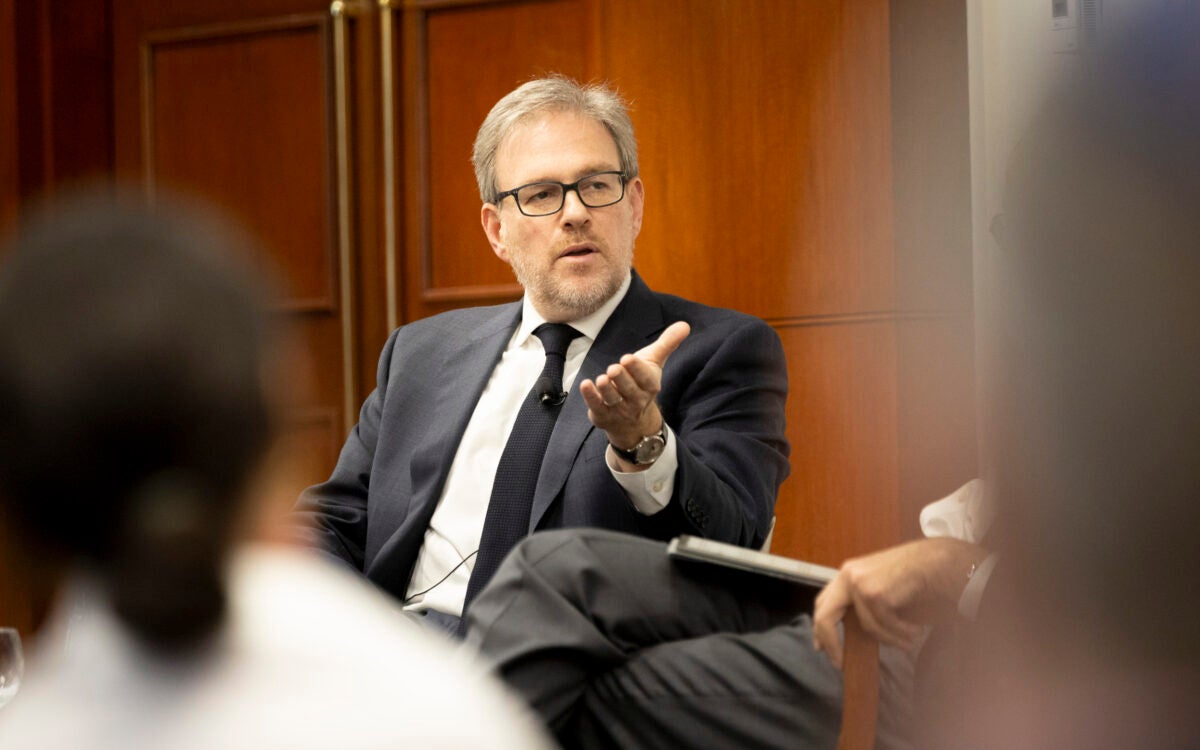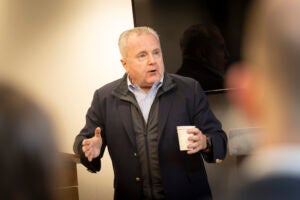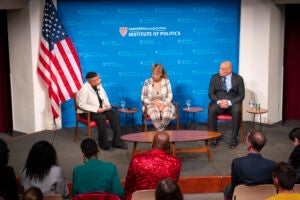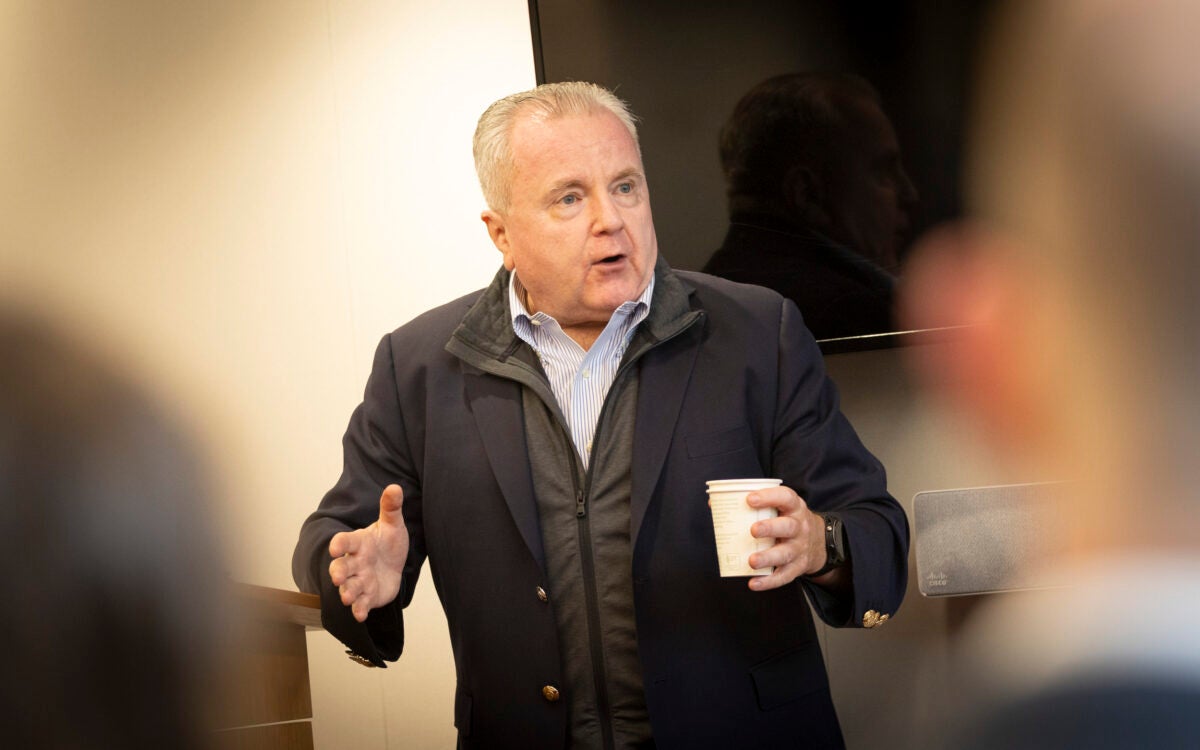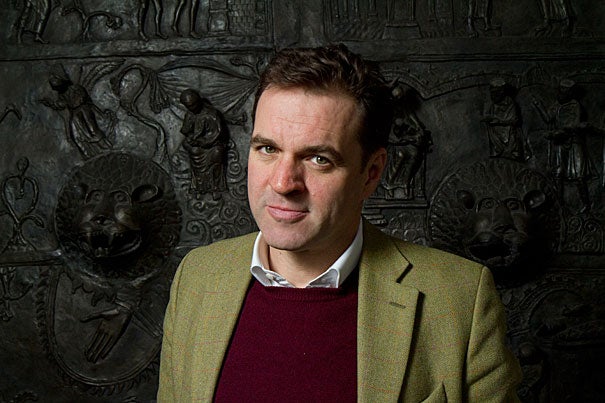
Niall Ferguson, the Laurence A. Tisch Professor of History at the Faculty of Arts and Sciences and a native of Glasgow, says the recent surge in support for Scotland’s independence from the United Kingdom is due to the Scottish National Party’s well-run campaign.
File photo by Jon Chase/Harvard Staff Photographer
A union scotched?
Niall Ferguson gives his take on what’s at stake as Scotland weighs independence
A “yes” from Scotland’s voters on Thursday would split the country from the United Kingdom, ending a sometimes-prickly partnership that began in 1707.
Leading the pro-independence movement is the Scottish National Party (SNP), which holds the majority of seats in Scotland’s Parliament. The party has pushed for a national referendum since 2007, with SNP leader Alex Salmond calling it a “once-in-a-generation” opportunity for full self-determination. While the Scottish government controls many key arenas, including education, health, transportation, and agriculture, the British Parliament runs policymaking around other vital matters such as energy, national security, foreign policy, immigration, and taxation.
The U.K.’s political and financial establishments, including England’s three largest political parties and Prime Minister David Cameron, strongly oppose secession. The Royal Bank of Scotland and the Lloyds Banking Group recently announced plans to relocate their operations to England should voters approve independence. The banks reportedly fear damage to their credit ratings and customer flight as a result of fiscal, legal, and regulatory instability. Even Queen Elizabeth, who rarely opines publicly on political matters, said she hopes voters “will think very carefully” before deciding to leave the U.K.
The divisive issue has prompted the record registration of 4.3 million, or 97 percent of Scotland’s eligible voters. New polling suggests a statistical dead heat.
Niall Ferguson, the Laurence A. Tisch Professor of History at the Faculty of Arts and Sciences and a native of Glasgow, spoke with the Gazette about the referendum and what’s at stake for Scotland and the U.K. if the secession campaign succeeds.
GAZETTE: What’s driving this vote and why is it happening now?
FERGUSON: Well, the idea of an independent Scotland has, of course, historical precedents, but you have to go back before 1707 or even before 1603 if you want to find a truly independent Scotland. It was a more or less dead idea right down until the 1960s. The Scottish National Party came into existence in the 1930s, but it had virtually no support until there were, I suppose, the first signs of Scotland’s economic decline as the engine room of the British Empire in the ’60s and ’70s. In 1979, there was a referendum on devolution that would have given more power to Scotland, self-governing power, within the United Kingdom. That was defeated. In the 1990s, under Tony Blair’s government, there was another referendum on devolution and that was successful and so a Scottish Parliament was restored for the first time since 1707. And then, the question of course came up again: “If we can have our own parliament, why can’t we go the whole way?” It was the decision of the current U.K. prime minister, David Cameron, to offer Scotland’s residents a referendum on independence, yes or no, after the Scottish National Party won political power in Scotland. That’s the background to all of this.
In the end, what you’re seeing is a last-minute surge in support for a yes to independence which has only really looked like it could win in the last two or three weeks. For most of the campaign, polls had the noes ahead by roughly 10 points and then, suddenly, this gap evaporated and the big question is “Why did that happen?” Because clearly that seems like a very dramatic and sudden change in the public mood.
GAZETTE: What’s your sense as to why?
FERGUSON: I think it’s very simple. I think the no campaign has been very poorly run and the yes campaign has been very well run. The no campaign was entrusted to the Scottish Labour leadership because David Cameron felt — despite being the son of a Scotsman — that his English accent would be grist to the Nationalists’ mill, so the Labour leadership in Scotland took over the no campaign and essentially ran it like a very dull economics seminar, explaining ad nauseam that if Scotland voted yes, there would be confusion about what currency it should have and it would cause fiscal problems, etc. And it was just a very negative argument. Meanwhile, the SNP’s yes campaign was positive, upbeat. The Scottish National Party told and continues to tell a story of only upside to independence. They entirely conceal from the public the economic risks, which are huge. So we’ve really seen a kind of campaign-driven swing in which “don’t knows,” young voters, and habitual nonvoters have been successfully mobilized by the yes campaign vision of a Brave New Scotland separating itself from Tory-dominated England and becoming a kind of Scandinavian utopia.
GAZETTE: What are some of the political, economic, and national security implications if Scotland breaks away?
FERGUSON: There will be a rush of money out of Scotland because of the uncertainties about the currency, the distribution of the U.K. national debt, the negotiations about oil revenues. All of these things will make businesses very nervous about being based in Edinburgh, especially the big banks. Indeed, they’ve already made it clear that they will move their bases to London. So there will be an immediate economic impact on Scotland. I should think there will be a recession, and there will be a significant increase in unemployment. There probably will also be some negative economic effects for the U.K. as a whole because the political implications are so unclear. So that’s part one.
Part two, the politics: If it’s yes, it’s hard to believe that David Cameron can survive as prime minister. He might just conceivably fight off a leadership challenge, but I think it’s going to be difficult because this is going to look like his mistake. The confusion that will ensue, even if he stays on, will be immense because you’ll be witnessing one of the biggest divorce negotiations in political history. Three hundred-plus years of political union can’t get unraveled with a quickie divorce in Reno. This is going to take years to figure out. And while that’s being done, Scotland and England, not to mention Wales and Northern Ireland, will be in limbo politically. There will be a general election next year, probably, in which Scottish voters will get to vote, but how on earth a government will be able to be formed based on Scottish M.P.s when Scotland’s just voted to become independent, God only knows. In fact, you can imagine a situation in which the Labour Party won, but only would have a majority with its Scottish M.P.s. I think that would prompt really quite significant protest in England. So you have the potential for political uncertainty stretching on into next year.
And then of course, as people in the rest of the U.K. figure out what a Scottish yes means, we’ll have the Welsh arguing that they should be next, and more importantly, I think, the English saying, “What the hell?” There’s going to be a good deal of bitterness about what’s happened. The majority of English voters favor Scotland staying in the union. There’s no appetite for independence south of the border. But I think if Scotland votes yes, the English will be like the wronged spouse in a divorce case and they’ll be pretty unaccommodating in the negotiations that then ensue.
GAZETTE: Is it clear that Scotland would be welcomed into the European Union and if it is, what stature is it likely to have?
FERGUSON: Scotland’s nationalists claim they can stay in the European Union, but actually they will not be able to do that. They’ll have to apply to become members if they secede from the U.K., which is of course a member. If you’ve ever been to Iceland, you’ll know the answer to that question. They’ll essentially be a somewhat bigger version of Iceland. The same applies to membership of NATO; this will be a new state that will have to do a lot of things from scratch. There will not be a great deal of enthusiasm because for those countries that have separatist regional movements like Spain, Italy, and Belgium, the precedent will obviously be a very disturbing one, and I would imagine that in Spain in particular — where the Catalonian and Basque separatist movements have been a problem for many years for the government of Madrid — the likely attitude may even be “get lost.”
GAZETTE: What do you think about the argument that Scotland hasn’t received its fair share from the U.K. politically or economically and that going it alone will preserve or improve the quality of life for more people?
FERGUSON: Well, it’s just complete nonsense. It’s at variance with the truth. The Scots actually have higher per capita public spending than the English by a substantial amount. Resources have been flowing to Scotland far more open-handedly than to the north of England for years. And you’ve got to remember, something like 11 prime ministers, including the last two before David Cameron, have themselves been Scots. You could argue, if anything, that Scotland has been overrepresented in the U.K. system. For many years, it had many more M.P.s than its population would have entitled it to in a strictly proportional system. And the Scots have done very well indeed accessing England’s institutions. I was one of those Scots who benefited from studying at Oxford and I’ve spent more of my life in England than I have in Scotland. I’m pretty typical of the kind of beneficiary of the union that Scotland’s been producing since the days of James Boswell. So there’s just a total lack of any evidence in the Scottish National Party’s claim that somehow Scotland’s been disadvantaged. The very opposite is true. To try to turn Scotland’s history into some version of Ireland’s is, I think, completely a travesty. Scotland was not colonized by the English; Scotland entered a union of equals. Indeed, in 1603 it was a Scottish king who took over the English throne. This idea that somehow the Scots are the last victims of English colonialism is preposterous; it’s completely without a foundation in reality.
GAZETTE: Who stands to benefit from independence and who is likely to be hurt by it?
FERGUSON: The great Scottish economist Adam Smith warned that it’s the people with ideas for radical constitutional change that are usually the people who would benefit most from them. And the self-aggrandizement of the Scottish National Party’s leadership will be the first consequence of this referendum if the result is yes. The losers will be those they persuaded to vote for them because the kind of people who will be hit hardest economically are probably the working-class voters who are defecting from the Labour Party to vote yes. Because if there is — as I’m sure there will be — a big economic shock in the wake of a yes vote, jobs will be lost, house prices will fall, incomes will be reduced, and the brunt will be borne by ordinary people, many of whom have been lured into the yes camp with completely mendacious promises. And that’s one of the sad things about this — the failure of the no campaign successfully to nail the economic lies in the yes campaign.
GAZETTE: What are the most pressing issues the Scottish government would need to address right away if the independence campaign succeeds?
FERGUSON: Well first, what currency are you going to use, because the yes campaign’s claim that they can carry on using the pound is, in fact, not credible. You can’t vote for independence and then say, “Can we keep the monetary union, please?” In fact, political separation with monetary union is a recipe for trouble. And England can just say no, and I think that’s what will happen. So the Scottish government, if it wins this referendum, will pretty quickly have to come up with its own currency, which will be interesting. How do you finance this Scottish state without transfers from south of the border? You seem to assume you’re going to have all the revenues from the North Sea oil fields, but why? The oil may be located closer to Scotland than England, but it’s collectively owned by the U.K. So there are going to be questions about apportioning oil revenues, questions about apportioning shares of the national debt of the United Kingdom, questions about the defense assets located in Scotland, including the Trident nuclear missiles at the Faslane Naval Base. The list is a long one.
GAZETTE: How would an independent Scotland affect Westminster and specifically Cameron, who very publicly has urged voters to stay united?
FERGUSON: I think it’s going to be pretty difficult for him to survive as prime minister if it’s a yes. Because this was an initiative he didn’t need to take. He could have simply declined the idea of a referendum and the Scottish National Party wasn’t in a position to insist on one, so I think it’s hard for him to survive this.
GAZETTE: Why did he agree to it if it was so risky?
FERGUSON: The thought process was that the independence option would be defeated and that would be the end of that. There was complete confidence until about January that the referendum would go against independence. Very few people back at the beginning of this gamble considered very seriously the possibility of defeat. So it’s hard for him to explain this away. I think the other interesting consequence to consider is the even bigger blow for the Labour Party, which has depended for years on Scottish members of Parliament for its strength. And so people are going to be saying, “Whose fault was that?” — because, after all, it was Labour leaders who ran the campaign. So they’re in trouble, too. And then you have the spectacle of the U.K. Independence Party, which is mostly an English party, saying, “Well you see, this whole thing illustrates fundamental Conservative weakness” and that then means that potentially the anti-European elements in U.K. politics will gain. Ultimately, remember, there’s the possibility of another referendum down the road on U.K. membership of the European Union. Some people think a yes vote in Scotland might increase the chances of such a referendum happening and the result being in favor of leaving. Then you get into some pretty wild scenarios.
GAZETTE: Which way do you think the voting will go, and why?
FERGUSON: Any expert on British politics will tell you it should be a narrow no win in the end, because in referendums typically people pull back from change in the final days of a race, risk aversion kicks in, people don’t necessarily vote in the polling booths the way they say they’ll vote to pollsters. So, for a whole bunch of reasons, people will tell you it’s going to be no. I wish I had such faith in opinion polls and I wish I did not feel that the momentum of the yes campaign has become hard, if not impossible, to stop. Right now this thing is statistically too close to call. And so it will be decided by a relatively small number of people. And I think that’s why, if you’re looking at the final days of the campaign, the people on the fence or undecided or apathetic seem to me more likely to break for yes because the atmosphere in Scotland, where I just was, is palpably pro-independence. Although it’s 50-50 in the polls, you wouldn’t know it to do a public debate or to walk down the street. Yes is dominant; no is almost silent — partly because the campaign’s been badly run and also because there’s a certain amount of intimidation going on. It could still be narrowly yes, in which case we’re going to wake up on Friday to a very changed Europe, not just a changed Britain.
GAZETTE: In an essay in The Sunday Times, you said that if yes prevails, your first act will be to apply for U.S. citizenship. Why is that?
FERGUSON: I have lived in the U.S. for more than 10 years and I’ve hesitated to become a U.S. citizen because of a sense of loyalty to the country where I was born and raised, which was extremely good to me; because of a sense of loyalty to my parents and grandparents and great-grandparents. Great Britain was a term devised by a Scotsman, James VI of Scotland, when he became James I of England. It’s a term that connotes the union of Scotland and England and I have loyalty to that union. I don’t have any feelings of loyalty to a U.K. without Scotland and I don’t have any feelings of loyalty to whatever little country Alex Salmond, the SNP leader, thinks he’s creating. So my homeland will kind of die if it’s a yes vote; it won’t really exist anymore, at which point I think I can square applying for U.S. citizenship with my conscience.
I think independence would be a disaster for the U.K., a disaster for Europe, a disaster for the West. The unraveling of the United Kingdom is a major problem given that the United Kingdom has been the staunchest ally of the United States since 1917. And, since ultimately the United Kingdom stands for a certain set of values that need to be upheld in Europe, anything that weakens the U.K., as this clearly would, has negative implications for the things that we all, I hope, hold dear: individual freedom, the whole idea of representative government, the concept of the free market. These are ideas that were born in many ways in Scotland in the Enlightenment in the 18th century and they’ve been hugely successful in their incarnation here in North America. They’ve been pretty successful in the U.K., as well. That’s why I really feel a no vote is to be preferred. This is not really about what passport I will carry in future. It’s about something much, much bigger than the question of whether or not Scotland should be an independent state. It’s about the ultimate stability of the Enlightenment’s achievements.
This interview has been edited for length.
